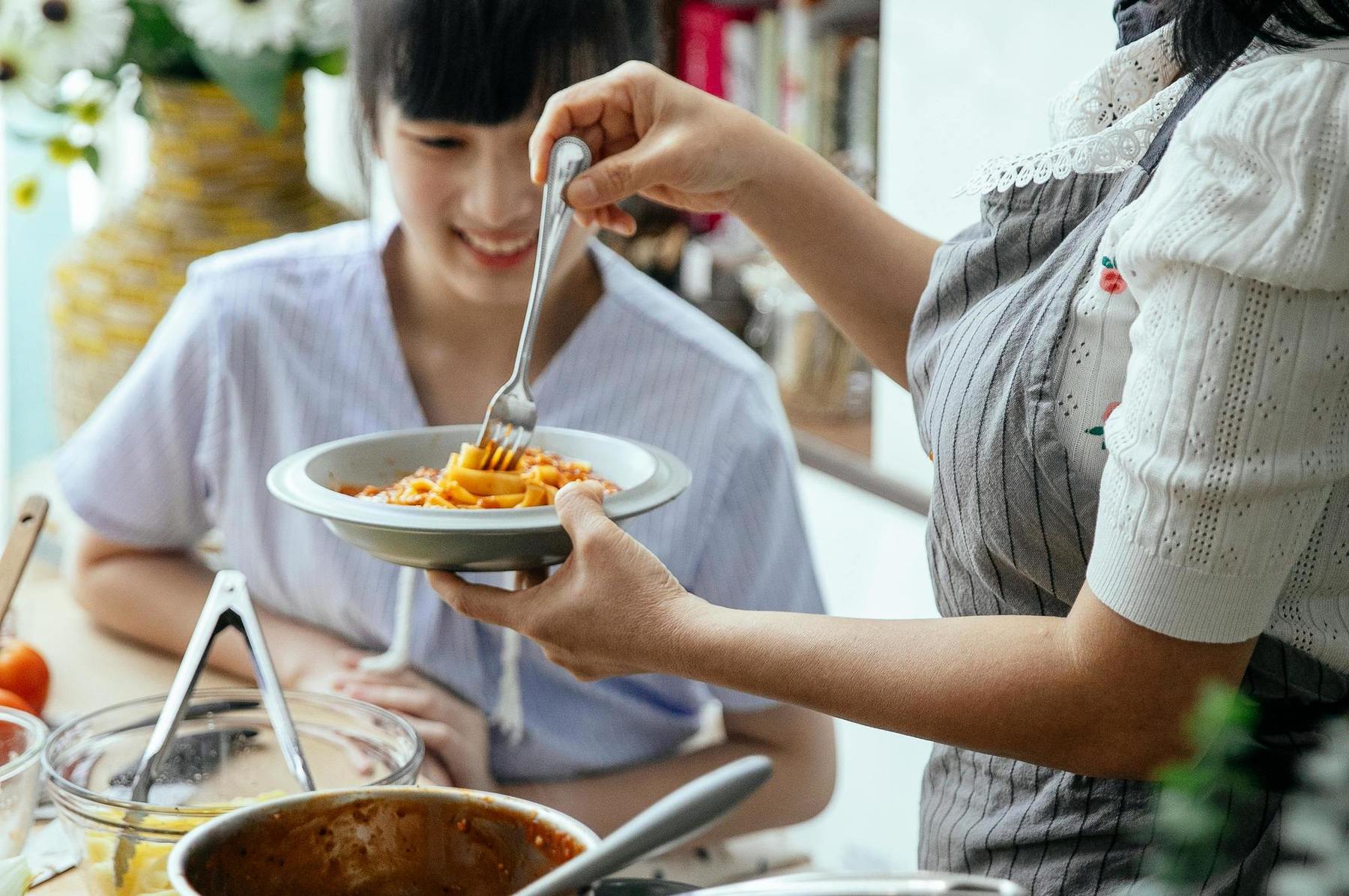Emotional eating is eating in response to our emotions instead of biological hunger. It is a common and normal behavior resulting from negative and positive emotions. Eating is an emotional experience, so it makes sense that when we feel happy or sad, we may feel drawn to food for comfort.
Sometimes, emotional eating can be a coping strategy and turn into a way to avoid, distract, or numb your emotional experiences. If eating is our only tool for emotional coping, it can become problematic, but turning to food for comfort shouldn’t automatically be something to villainize. In fact, most of emotional eating’s negative effects are likely tied to how we perceive our relationship with food.
When we think something is bad, the behavior causes negative emotions, beliefs, and shameful inner thoughts. But emotional eating is something we all do. Normalizing this experience helps us decrease the shame and guilt we may feel around food and eating and helps us restore our relationship with food and our bodies.
Having an emotional connection to food isn’t necessarily a bad thing. Eating is one of the first emotional soothing behaviors we learned as infants. Babies nurse to feel connected and safe with their caregivers. Eating is essential for survival but also a way to connect with others, build memories, and feel comforted. In this article, we will explore emotional eating in hopes of destigmatizing this behavior and lessening any guilt or shame you’re holding on to surrounding your relationship with food and your body.
What is Emotional Eating?
Emotional eating is a normal and common behavior that happens when we eat in response to our emotional hunger instead of our biological hunger. Emotional hunger occurs when our desire for food is rooted in an emotion. There is a misconception that emotional eating only happens in response to negative emotions like stress, sadness, or anger. However, emotional eating can also result from positive feelings like excitement and joy.

Examples of Emotional Eating
- Making your favorite comfort food because it reminds you of your family
- Going out to dinner to celebrate a promotion
- Eating a container of ice cream after a breakup
- Eating a container of cookies when you’re home alone at night
- Eating a bag of chips to make an all-night study session more enjoyable
- Finishing a leftover pie in anticipation of a big work presentation the next day
- Finishing off the pizza even after becoming full because you’re out with friends and having a lot of fun
- Eating as a form of celebration at your friend’s wedding
Mental Health and Emotional Eating
Diet culture and health fads have altered our perceptions of eating, making us believe that we should stick to certain foods and only eat when hungry. These messages lead to shame around emotional eating, even though it is a behavior that each of us engages in from time to time.
The negative impact of emotional eating is oftentimes tied to how we interpret the behavior, and this interpretation typically stems from society’s endless messaging around what we should eat and how we should look. Overanalyzing our diet and appearance can lead to a negative relationship with food that severs us from our intuition around hunger, fullness, and satiety. We have trouble knowing when our bodies are asking for food, when we are physically full, and when our meal or snack is satisfying. Troubles with intuitive eating can be a precursor to emotional eating.
The hard part is that if we label emotional eating as “bad,” the research shows there is a ripple effect of negative emotions, shaming self-talk, and increased restrictive eating that follows. This ripple effect leads to depression, low self-esteem, and anxiety. Then, these heavy emotions create a cycle where we are more likely to return to food to cope.
If you’re in a repetitive cycle of emotional eating, increasing your awareness of your associations with food can help change your relationship with your emotional hunger. When we can differentiate between emotional and physical hunger, we can expand our soothing toolkit so that food is not our only available coping strategy.
Gaining more insight into your biological and emotional hunger and adding more coping mechanisms, such as nature walks, journaling, breathing exercises, calling a friend, or drinking tea, can help you feel more confident about navigating food even when you feel emotional. Then, we can reframe our narratives around food, editing our beliefs to incorporate some of the positive aspects. At its core, eating is an essential part of life and a social experience that brings us together to form core memories.
Emotional Eating and Your Relationship with Food
Effects of Emotional Eating
Emotional eating isn’t good or bad. It’s just a behavior. The perceived risks of emotional eating are more likely tied to our society’s anti-fat biases and idealization of thinness. The shame of emotional eating is connected to our judgment of body size. But, as with any behavior, emotional eating does come with side effects. Below, you can find a few examples.
Negative Side Effects
- Risk of disordered eating
- Stomach pain
- Poor sleep
- Increased depression or anxiety
Positive Side Effects
- Relief
- Nourishment
- Joy
- Self-compassion

Positive Benefits of Emotional Eating
Eating for Pleasure
Eating foods we enjoy is a joyous experience. It forms memories with people we love or care about. Also, when eating something delicious, our attention is turned toward our senses. We notice how the food looks, smells, and tastes. This increases our mindful eating skills—a key component in intuitive eating!
Building Community
Holidays, special occasions, and group get-togethers all typically involve food. During these experiences, we may eat when we aren’t biologically hungry. Instead, we eat to embrace the moment and connect with others. Eating as a means of celebration builds community and makes us feel less lonely.
Nourishment
Eating in response to our emotional hunger signals to our body and brain that we are willing to offer ourselves comfort. It is a way to care for ourselves when feeling sad, lonely, excited, or joyful. Honoring our emotional hunger increases our self-compassion and offers us emotional nourishment.
Reminiscing or Nostalgia
When we enjoy foods tied to our core memories, even if we aren’t biologically hungry for them, it connects us to those times. Eating our favorite childhood dessert or our grandma’s family recipes connects us to our past and can be healing and comforting.
When is Emotional Eating a Concern?
Emotional eating is primarily considered a normal behavior, but when it becomes a trapping cycle, it can become harmful. The first step to recognizing if emotional eating is a problem is to assess its intensity and frequency.
Do you feel out of control? Are you thinking about food all the time? Are you finding yourself emotionally eating more often? If you’re answering yes to these questions, it might be time to consider reaching out for support. Increased frequency and intensity of emotional eating can put you at risk of developing a clinical eating disorder.
We don’t want emotional eating to be our only way of coping with emotions. We need a toolbox of strategies that soothe and regulate our nervous systems. If we continually resort to emotional eating each time we feel a big emotion, we will only get temporary relief without addressing the underlying problem or trigger.
Therapy for Emotional Eating
If you are struggling with your relationship with food, establishing a support system can be a helpful first step toward change. By finding a therapist whom you feel comfortable with, you can begin to explore your unique relationship with emotional eating and start developing additional ways of coping with overwhelming feelings. In therapy, you may untangle your beliefs about food and body image, identify and connect with your emotions without food, and learn to cope in ways that promote lasting change.
Find an eating disorder therapist in Seattle.
Thrive for the People has a team of therapists who treat a wide range of eating struggles. You can schedule a free consultation call with a team member to see if one of the therapists would be a good fit in supporting you.




